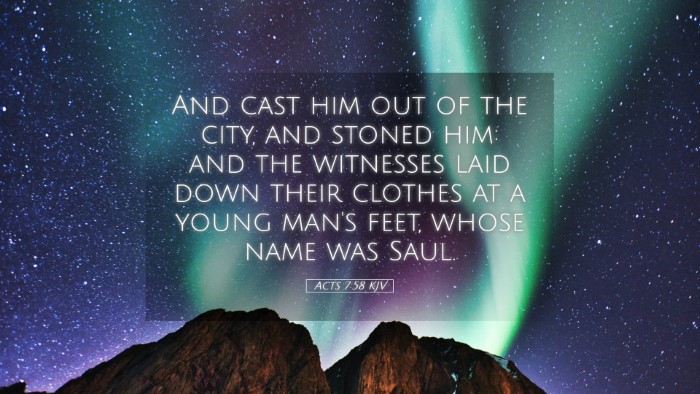Commentary on Acts 7:58
The verse Acts 7:58 plays a pivotal role in the narrative of Stephen's martyrdom, providing significant insight into the early Christian church's struggles and the opposition faced by its leaders. This commentary amalgamates the thoughts of renowned biblical scholars such as Matthew Henry, Albert Barnes, and Adam Clarke.
Verse Context
Acts 7:58 (KJV): “And cast him out of the city, and stoned him: and the witnesses laid down their clothes at a young man’s feet, whose name was Saul.”
Overview of the Scene
This verse occurs at the climax of Stephen's defense before the Sanhedrin, where he is accused of blasphemy. His bold proclamation of the gospel and defense of the Christian faith infuriate the Jewish leaders, leading to an extreme act of violence against him.
Analysis of Key Themes
The Role of Stephen
Matthew Henry emphasizes Stephen’s role as a martyr and the first to face such severe opposition for his faith. His steadfastness in preaching the truth, even at the cost of his life, reflects the ultimate example of faithfulness and courage in the face of persecution.
The Act of Stoning
Albert Barnes highlights the cultural and legal practice of stoning in ancient Israel, noting that it was a method of capital punishment prescribed for blasphemy and other offenses. The mob's action symbolizes the rejection of both God’s servant and the message of Jesus Christ.
The Witnesses’ Clothing
Act 7:58 notes that the witnesses laid down their clothes at the feet of a young man named Saul. Adam Clarke points out that this act signifies approval and participation in Stephen's execution. Saul, later known as the Apostle Paul, serves as a key figure in the early church and a dramatic example of transformation from persecutor to proclaimer of the gospel.
Significance of Saul
This verse not only marks the tragic end of Stephen’s life but also introduces Saul, whose life encapsulates the theme of redemption. Matthew Henry suggests that Saul’s presence at the stoning indicates the beginning of a pivotal change in the church—where persecution would lead to the spread of the Gospel.
Theological Reflections
The stoning of Stephen is a stark reminder of the price of discipleship. Albert Barnes notes that followers of Christ can expect to face trials and tribulations. It serves as a call for believers to remain steadfast and courageous, echoing Jesus' own warning in John 15:20 that they will face persecution as He did.
Applications for Faith Communities
This event invites pastors, theologians, and scholars to reflect on the nature of faith in trials and the commitment one should have to truth, even at great personal cost. Adam Clarke encourages readers to consider how the early church’s example can inform contemporary ministry—focusing on unwavering faith amidst adversity.
Conclusion
The martyrdom of Stephen in Acts 7:58 is not just a historical account; it is a theological beacon that challenges believers to evaluate their commitment to Christ. The implications of this verse resonate through time, encouraging all to proclaim the truth boldly and live out their faith authentically, irrespective of external opposition.


